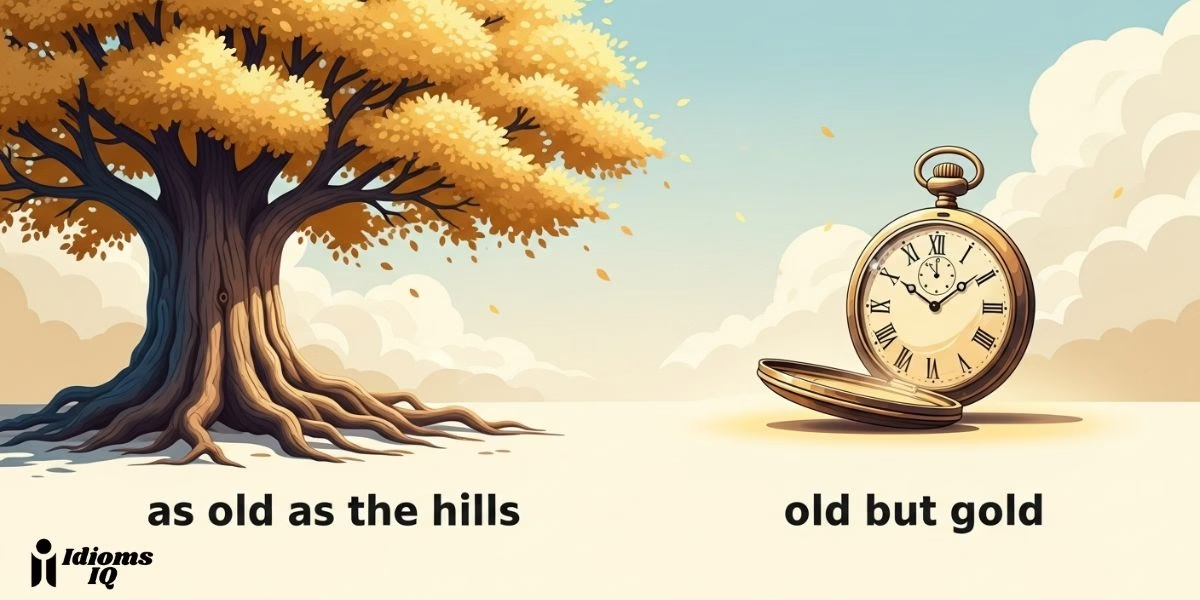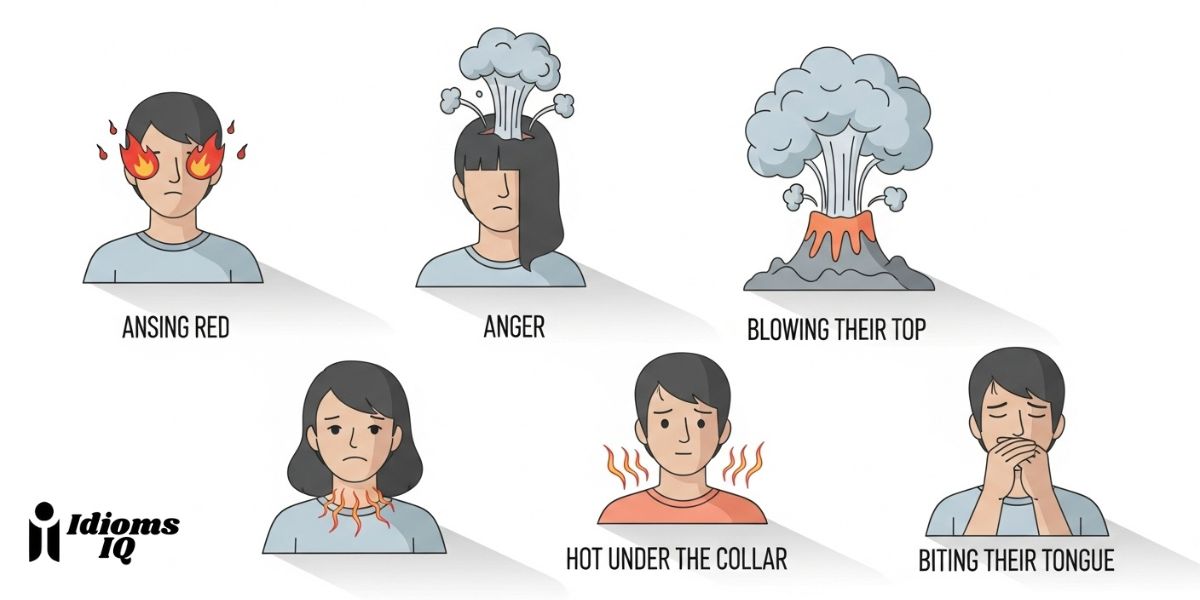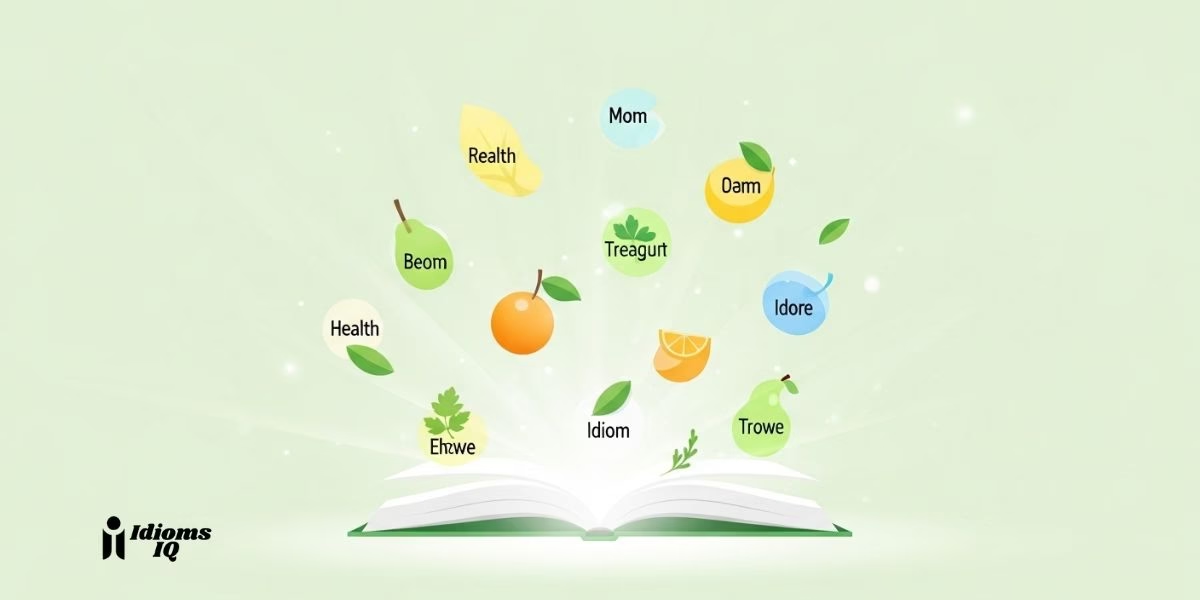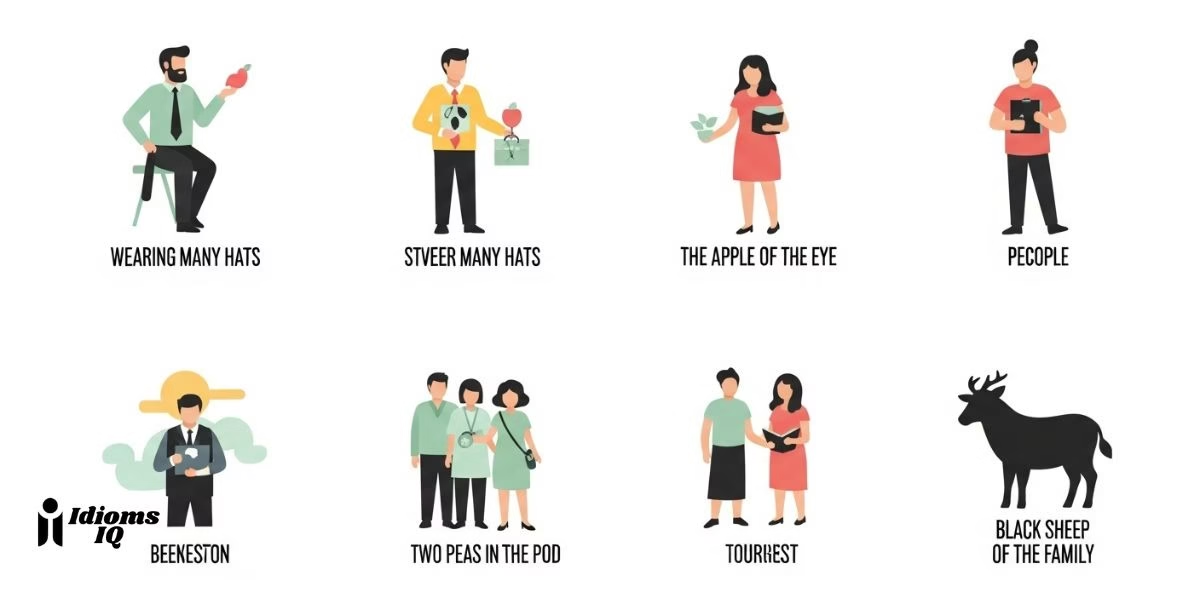
Have you ever felt lost for words, struggling to describe a feeling of utter confusion or the dizzying pace of change? Language, in its literal form, can sometimes fall short. This is where idioms come in—they are the secret keys to unlocking a deeper level of expression. Idioms are colourful phrases where the meaning isn’t obvious from the individual words alone; instead, they paint a vivid picture of a situation or emotion. Think of them as shared shortcuts in conversation that add personality and depth.
By exploring idioms for confusion, we can find comfort in knowing there’s a name for that feeling of being mentally tangled. They don’t just help us describe our experiences; they invite us to think more deeply, connect more authentically, and find clarity and motivation even when we feel completely lost. Embracing them is like adding a new set of tools to your communication toolkit, allowing you to navigate life’s complexities with greater wisdom and confidence.
Idioms for Being Confused
Here are 35 idioms to express the feeling of being lost or confused, perfect for enriching your vocabulary.
1. At a loss for words
- Meaning: Unable to think of anything to say.
- Use in a sentence: When she asked me to be the best man at her wedding, I was so surprised I was completely at a loss for words.
- Other ways to say it: Speechless, tongue-tied, dumbstruck.
2. All at sea
- Meaning: In a state of confusion and uncertainty.
- Use in a sentence: I was all at sea with the new accounting software until I watched a few tutorial videos.
- Other ways to say it: Lost, bewildered, perplexed.
3. Can’t make head nor tail of it
- Meaning: To be completely unable to understand something.
- Use in a sentence: I’ve read the instructions three times, but I can’t make head nor tail of how to assemble this bookshelf.
- Other ways to say it: It’s Greek to me, can’t get a handle on it, it’s all a muddle.
4. In a fog
- Meaning: To be confused, dazed, or not fully aware of your surroundings.
- Use in a sentence: After pulling an all-nighter to study, he walked around in a fog all day.
- Other ways to say it: In a daze, out of it, spaced out.
5. A deer in the headlights
- Meaning: To be so surprised or frightened that you cannot move or think.
- Use in a sentence: When the CEO asked him for the project update directly, he just stood there like a deer in the headlights.
- Other ways to say it: Frozen, stunned, paralyzed with fear.
6. Thrown for a loop
- Meaning: To be completely surprised, confused, or shocked.
- Use in a sentence: The sudden announcement of the company merger threw everyone for a loop.
- Other ways to say it: Taken aback, caught off guard, astonished.
7. Out of one’s depth
- Meaning: To be in a situation that is too difficult or complex to handle.
- Use in a sentence: As a new intern in the engineering department, he felt completely out of his depth during technical meetings.
- Other ways to say it: In over your head, out of your league, overwhelmed.
8. Scratching your head
- Meaning: To be puzzled or confused about something.
- Use in a sentence: The magician’s final trick left the entire audience scratching their heads in disbelief.
- Other ways to say it: Puzzled, mystified, baffled.
9. Lost in the weeds
- Meaning: To be so focused on small, unimportant details that you lose sight of the main point or goal.
- Use in a sentence: The team got lost in the weeds debating the color of the button instead of focusing on the app’s functionality.
- Other ways to say it: Bogged down in details, missing the forest for the trees, getting sidetracked.
10. Muddy the waters

- Meaning: To make a situation more confusing or complicated than it already is.
- Use in a sentence: Bringing up old arguments will only muddy the waters and prevent us from reaching a solution.
- Other ways to say it: Complicate the issue, create confusion, obscure the facts.
11. A gray area
- Meaning: A situation or topic that is not clear or does not fit into a specific category.
- Use in a sentence: The legality of using that software for commercial purposes is a gray area.
- Other ways to say it: Unclear, ambiguous, an uncertain situation.
12. Up in the air
- Meaning: Undecided or uncertain; not yet settled.
- Use in a sentence: Our vacation plans are still up in the air until we can get the time off work approved.
- Other ways to say it: Undecided, unresolved, pending.
13. Not have a clue
- Meaning: To have no knowledge or information about something.
- Use in a sentence: I don’t have a clue how to fix this computer; we should call a technician.
- Other ways to say it: In the dark, clueless, have no idea.
14. See through a glass, darkly
- Meaning: To have an unclear or imperfect understanding of something.
- Use in a sentence: We can only see through a glass, darkly what the future of technology holds.
- Other ways to say it: Have a vague idea, understand imperfectly, have a hazy view.
15. In a spin
- Meaning: To be in a state of confusion or panic.
- Use in a sentence: The news that her flight was canceled sent her into a spin.
- Other ways to say it: In a tizzy, flustered, agitated.
16. Baffled
- Meaning: To be completely bewildered or perplexed.
- Use in a sentence: The detectives were baffled by the lack of evidence at the crime scene.
- Other ways to say it: Mystified, stumped, puzzled.
17. Discombobulated
- Meaning: To feel confused, unsettled, and out of sorts.
- Use in a sentence: Waking up in a different time zone left him feeling completely discombobulated.
- Other ways to say it: Disoriented, flustered, thrown off balance.
18. It’s all Greek to me
- Meaning: I cannot understand it at all.
- Use in a sentence: My brother tried to explain quantum physics, but it was all Greek to me.
- Other ways to say it: Incomprehensible, unintelligible, over my head.
19. Beating around the bush

- Meaning: To avoid talking about the main topic by discussing irrelevant things.
- Use in a sentence: Stop beating around the bush and just tell me what you really think about the proposal.
- Other ways to say it: Evading the issue, mincing words, hedging.
20. A wild goose chase
- Meaning: A hopeless and pointless search for something.
- Use in a sentence: We spent all day on a wild goose chase looking for a sold-out toy.
- Other ways to say it: A fool’s errand, a pointless pursuit, a useless task.
21. On the horns of a dilemma
- Meaning: To be faced with a difficult choice between two equally undesirable options.
- Use in a sentence: She was on the horns of a dilemma: either accept a job she didn’t want or remain unemployed.
- Other ways to say it: Between a rock and a hard place, in a catch-22, in a bind.
22. In two minds
- Meaning: To be undecided or unable to choose between two things.
- Use in a sentence: I’m in two minds about whether to travel this summer or save the money.
- Other ways to say it: Undecided, ambivalent, on the fence.
23. A closed book
- Meaning: A subject or person that is difficult to understand.
- Use in a sentence: I’ve tried to get to know him, but he’s a complete closed book.
- Other ways to say it: An enigma, a mystery, hard to read.
24. Can’t see the forest for the trees
- Meaning: To be so focused on small details that you miss the overall picture.
- Use in a sentence: He’s so worried about the font size that he can’t see the forest for the trees and realize the whole report is disorganized.
- Other ways to say it: Lost in the details, missing the big picture, bogged down.
25. Clear as mud
- Meaning: Not clear at all; very confusing (used ironically).
- Use in a sentence: His explanation on how to solve the problem was as clear as mud.
- Other ways to say it: Confusing, unclear, incomprehensible.
26. A puzzle wrapped in an enigma
- Meaning: Something or someone that is extremely mysterious and difficult to understand.
- Use in a sentence: The sudden disappearance of the ancient artifact is a puzzle wrapped in an enigma.
- Other ways to say it: A complete mystery, a conundrum, baffling.
27. To be floored
- Meaning: To be so surprised or shocked that you don’t know what to say or do.
- Use in a sentence: I was completely floored when they announced I had won the award.
- Other ways to say it: Stunned, astounded, dumbfounded.
28. Mind-boggling
- Meaning: Extremely surprising, confusing, or difficult to understand.
- Use in a sentence: The sheer size of the universe is mind-boggling.
- Other ways to say it: Overwhelming, staggering, bewildering.
29. To be stumped

- Meaning: To be unable to answer a question or solve a problem.
- Use in a sentence: The final question on the quiz show left even the smartest contestant completely stumped.
- Other ways to say it: Baffled, perplexed, at a loss.
30. Not know whether you are coming or going
- Meaning: To be in a state of extreme confusion and disorganization.
- Use in a sentence: With three different projects due on the same day, she didn’t know whether she was coming or going.
- Other ways to say it: Overwhelmed, in a state of chaos, flustered.
31. Go around in circles
- Meaning: To do a lot of work but make no progress towards a solution.
- Use in a sentence: We’ve been going around in circles in this meeting; it’s time to make a decision.
- Other ways to say it: Getting nowhere, spinning your wheels, making no headway.
32. A head-scratcher
- Meaning: A difficult problem or question that makes you think hard.
- Use in a sentence: Why he would quit a great job for no reason is a real head-scratcher.
- Other ways to say it: A puzzle, a mystery, a conundrum.
33. Sixes and sevens
- Meaning: In a state of confusion or disarray.
- Use in a sentence: After the surprise audit was announced, the whole office was at sixes and sevens.
- Other ways to say it: Disorganized, in a muddle, chaotic.
34. Feel like a fish out of water
- Meaning: To feel uncomfortable or out of place in a particular situation.
- Use in a sentence: As a country boy, he felt like a fish out of water in the bustling metropolis.
- Other ways to say it: Feel awkward, don’t fit in, feel out of your element.
35. Don’t know which way to turn
- Meaning: To be in a situation where you don’t know what to do next.
- Use in a sentence: After losing his job and his apartment in the same week, he didn’t know which way to turn.
- Other ways to say it: At a crossroads, in a quandary, unsure what to do.
Idioms for Constant Unpredictable Change

1. The shifting sands
- Meaning: A situation that is constantly changing, making it unstable and unpredictable.
- Use in a sentence: Trying to build a long-term business strategy in this market is like building on shifting sands.
- Other ways to say it: In a state of flux, constantly evolving, unpredictable environment.
2. A moveable feast
- Meaning: A plan or event that is not fixed in time or place and is subject to change.
- Use in a sentence: The date for the company picnic is a moveable feast, depending on the weather forecast.
- Other ways to say it: Flexible, subject to change, not set in stone.
3. Chop and change
- Meaning: To repeatedly change your mind or plans, often in an annoying way.
- Use in a sentence: I wish the management would stop chopping and changing the project requirements.
- Other ways to say it: Vacillate, waver, be inconsistent.
4. Move the goalposts
- Meaning: To unfairly change the rules or conditions of a task or competition while it is still in progress.
- Use in a sentence: Every time I think I’ve met their expectations, they move the goalposts.
- Other ways to say it: Change the rules, alter the criteria, be unfair.
5. All bets are off
- Meaning: A situation where the previous assumptions or predictions are no longer valid due to a sudden change.
- Use in a sentence: With the star player injured, all bets are off for who will win the championship.
- Other ways to say it: Anything can happen, it’s unpredictable, the situation has changed completely.
Fill-in-the-Blank Exercise
Instructions: Complete each sentence with the most appropriate idiom from the list above.
- After the surprise pop quiz was announced, the students were at _______________.
- The new CEO’s plan to restructure the company is a real _______________.
- I’m _______________ about whether to accept the job offer in the city or stay here.
- His instructions were as _______________, and now I’m more confused than when I started.
- Trying to get a straight answer from him is impossible; he just keeps _______________.
- When the reporter asked the politician about the scandal, he looked like a _______________.
- The project’s deadline is a _______________; it changes every time we have a meeting.
- I tried to read the legal document, but it was _______________.
- After the merger, the new company policies left many employees feeling complete _______________.
- We’ve been _______________ for hours without making any real progress on this issue.
- He felt like _______________ at the formal gala, surrounded by celebrities and diplomats.
- With the sudden resignation of the team leader, our project plans are completely _______________.
- The manager keeps _______________, making it impossible to know what our priorities are.
- Trying to understand the new tax code has me _______________.
- When they announced that the flight was canceled, it is _______________ for a loop.
Answer Key
- sixes and sevens
- head-scratcher
- in two minds
- clear as mud
- beating around the bush
- deer in the headlights
- moveable feast
- all Greek to me
- discombobulated
- going around in circles
- fish out of water
- up in the air
- moving the goalposts
- scratching my head
- it threw me
Conclusion:
Mastering idioms is more than just a linguistic exercise; it’s a journey into the heart of a culture and a powerful way to enhance emotional intelligence. When we use a phrase like “all at sea,” we’re not just saying we’re confused—we’re tapping into a shared human experience of feeling adrift and directionless.
Regularly incorporating these expressions into our writing and speech makes our communication more vibrant, relatable, and nuanced. It challenges us to think metaphorically and to understand the subtle shades of meaning in human interaction. By practicing and internalizing idioms, we build richer vocabulary and deeper empathy for the complex, often confusing, but ultimately beautiful tapestry of life.






